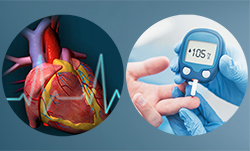
Feedback ID : 1_1_10326
March 8th, 2015

Think about it: Heart disease and diabetes, which account for more deaths in the U.S. and worldwide than everything else combined, are completely preventable by making comprehensive lifestyle changes.
– Dr Dean Ornish, Clinical Professor of Medicine at the University of California, San Francisco
With the restructuring of health care in India, one of the major changes in patient care has been a shift from sub-speciality care to primary care. Despite major progress in the development of effective therapies to reduce mortality and morbidity from cardiovascular disease, it is becoming the leading cause of mortality in India, where heart ailments have replaced communicable diseases as the biggest killer. According to recent data, approximately 30 per cent of the urban population and 15 per cent of the population living in rural areas, suffer from high blood pressure and heart attacks. According to government data, the prevalence of heart failure in India due to coronary heart disease, hypertension, obesity, diabetes and rheumatic heart disease, ranges from 1.3 to 4.6 million, with an annual incidence of 491,600-1.8 million.
Although effective treatments exist, there is a wide therapeutic gap between guidelines and practice. Reducing this gap has the potential to save lives. General Practitioners are at the forefront of assessment, management and follow-up of patients with cardiovascular disease. Over 50 per cent of the patients suffering from a heart attack die before they reach the hospital. General Practitioners can play a very important role in saving these lives.
MediSys eVarsity has launched the Fellowship in Cardio Diabetes mellitus to equip such first-consult doctors, with the latest clinically-relevant information, and to mentor them in handling all aspects of cardiovascular disease.
The Six months Fellowship in Cardio Diabetes mellitus aims at providing a General practitioner with comprehensive up-to-date knowledge and skills in the prevention and diagnosis and treatment of cardiovascular disease in their clinical practice.
Recognised the need of the hour, of turning graduate doctors into family physicians, who thrive on building a relationship with the patients and family, rather than treat them as numbers, MediSys eVarsity has specially crafted these courses for experienced practising doctors – doctors who could not take up post-graduation for whatever reason, doctors who are so busy with their practice that they do not find time to attend continuous medical education. These courses are made available for the doctors.
Cardiorenal Metabolic Approach for T2DM: Role of SGLT-2 Inhibitors
Cardio–Rheumatology: It’s Time to Collaborate
Obesitis (Obesity + Inflammation)
Thyroid Disorders and Cardiodiabetes Link
Rheumatological Manifestations of Diabetes Mellitus
Diabetes in the (Very) Young
Strategies for Reducing Hospital Readmissions for Heart Failure
Patients
Diabetic Nephropathy: Recent Advances in Pathophysiology
and Management
Tuberculosis and Diabetes: The Terrible Twosome
Cardiovascular Complications in Prediabetes
Nonalcoholic Fatty Liver Disease and Its Association with Central Obesity, Dyslipidemia, and Impaired Glucose Tolerance and
Diabetes
Tachyarrhythmias: What Physician Needs to Know?
Heart Failure in Diabetes: Frequent, Forgotten, Fatal
Cardio-obstetrics: Why do We Need this New Field in India?
Early End Organ Protection in Diabetes Mellitus with Hypertension
Section 3: Investigations
Diabetic Autonomic Neuropathy and Autonomic Function Testing
Evaluation of Hypertension in Young
Diabetes and Gut Microbiota
Continuous Glucose Monitoring Systems: Current Concepts
Biomarkers in Heart Failure
Section 4: Invasive Procedure
Choice of Patients for MitraClips as Therapy for Heart Failure
Running the Race Against Heart Failure: The Progress Made So Far
Section 5: Therapeutics Options
Chrono-nutrition: A New Dietary Dimension
Colesevelam
Oral Semaglutide
Diabetic Heart Failure: The Role of Angiotensin
Receptor–Neprilysin Inhibitor
Management of Anticoagulation in Pregnancy
Swallowable Balloon and Endoscopic Bariatric Procedures:
The New Match Winner
Dose Adjustments and Intensification of Insulin Therapy in
Type 2 Diabetes Mellitus
Glycemic Control in Renal Failure
Sodium-glucose Cotransporter-2 Inhibitors in Heart Failure
Pioneering Basal-bolus Therapy with Next Generation Insulins in Hospitalized Patients
Gliflozins in Heart Failure: An Update
Postprandial Hyperglycemia and Glycemic Variability Start Early
with Glinides
The Role of Alpha-blockers in Uncontrolled Hypertension
Progress and Challenges in Obesity Pharmacotherapy
Section 6: Prevention
Prevention of Cardiometabolic Syndrome—Possible
Thin-fat Indians, Sarcopenia: Atypical Asian Indian Phenotype
Digital Book:
A typical digital book is in a page turn format with easy to follow explanations alongside a range of exhibits and is integrated with audio-video sessions. All the material is developed as per the latest curriculum prescribed by regulators. It offers a succinct coverage of requirements and is periodically updated.
There is a final exam that will be conducted online at the end of the course